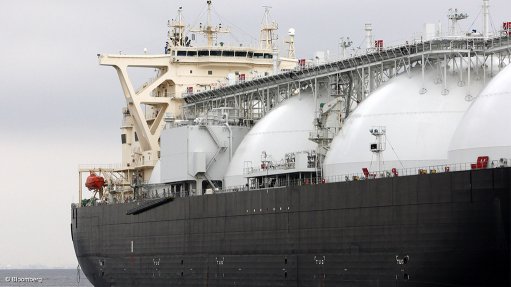
Photo by: Bloomberg
PERTH (miningweekly.com) – The Australian Petroleum Production & Exploration Association (Appea) has called for the withdrawal of market interventions such as domestic gas reservation policies, after the Productivity Commission released a report stating that such measures were unlikely to be effective or efficient in the long run.
In its report, titled ‘Examining barriers to more efficient gas markets’, the Productivity Commission cautioned that governments had to be mindful that policies that interfered with market signals could undermine investment incentives, including incentives to bring on new sources of gas supply.
The report also warned that policies designed to accelerate production, such as the use-it-or-lose-it mechanism, had the risk of bringing forward gas production in a way that would reduce community benefits.
“Even if the gas industry were hoarding reserves to exercise market power, a use it or lose it policy would be unlikely to deliver material benefits for eastern market gas users. There is no assurance that any additional gas would be channelled to domestic users rather than export markets. One likely consequence of the policy would be to reduce the incentives to bring on new sources of supply,” the report said.
However, the commission noted that there could be merit in a closer examination of the existing arrangements for the initial allocation of tenements to gas companies.
“Mechanisms that promote the allocation of tenements to those who can make the best use of them, including the ability to trade exploration and production licences in secondary markets, are a strong safeguard against inefficient hoarding of gas reserves. The Australian and Queensland governments have recently introduced cash bidding for some gas resources, and these schemes could provide insights into auction design and the scope for their broader application.”
“The commission’s report is a welcome and thoughtful contribution to a debate that has been too often characterised by misinformation and poorly considered policies,” Appea acting CEO Paul Fennelly said.
“The commission rightly concludes proposals such as domestic gas reservation should be consigned to the scrap heap. Advanced economies underpinned by competitive markets, such as Australia, should not rely on one industry to subsidise another.”
Fennelly said that the report’s key finding; that developing a gas export industry in eastern Australia would deliver a net benefit to the community, was particularly welcome.
The commission found that removing regulatory burdens restricting exploration and production of natural gas, particularly in Victoria and New South Wales, was the clear pathway to not only allowing the market to work more efficiently and effectively, but also bringing on more gas supply.
“As the commission finds, the scientific evidence suggests that the technical challenges and risks can be managed through a well-designed regulatory regime.
“The gradual removal of market distortions has delivered significant economic benefits to the nation. The commission should be congratulated on its findings that interventions such as domestic gas reservation would reverse those gains.”
The findings from the Productivity Commission report are directly opposite to a February report by New South Wales Senate Committee on the supply and cost of gas and liquid fuels, which proposed the introduction of an Australia-wide gas reservation policy to assist in containing gas prices and to ensure security of supply.
That report also suggested that the development of the state’s coal seam gas (CSG) reserves alone would not address the challenges facing the market, and further recommended that the state government hold back on the expansion of the CSG industry until recommendations by the chief scientists and engineer, made in 2014, were implemented in full.